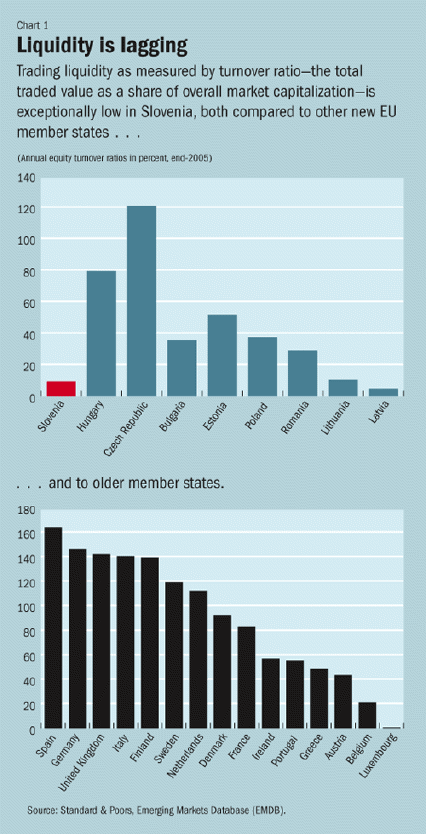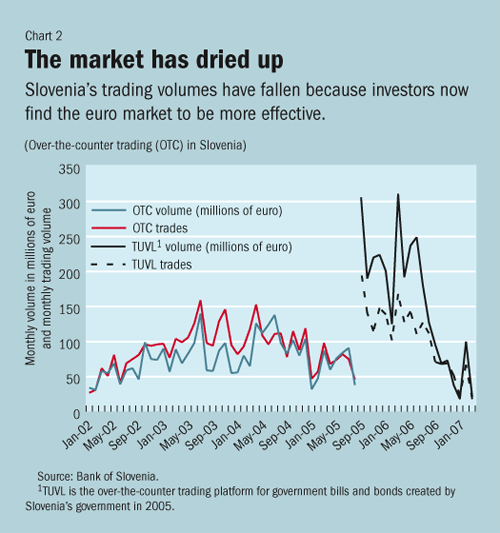
Typical street scene in Santa Ana, El Salvador. (Photo: iStock)
IMF Survey: Deeper Capital Markets Could Help Slovenia
June 13, 2007
- Development of Slovenia's capital markets is lagging behind that of its peers
- Deeper capital markets would boost Slovenia's growth potential
- Fully embracing EU financial market regulations would speed up integration
Despite its successful transition to a market economy following the collapse of the Soviet Union, Slovenia has lagged behind its EU peers in terms of financial sector development.

Construction site at Bled, Slovenia—where bank-based lending system penalizes small, innovative firms (photo: Srdjan Zivulovic/Reuters)
FINANCIAL SECTOR DEVELOPMENT
Both bank and nonbank financial assets relative to GDP—particularly nonbank assets—are well behind the numbers for other EU members with similar incomes (see table). Slovenia's bank-based system has concentrated on lending to established companies, thereby inadvertently penalizing small and innovative firms.
Stock market turnover is low, public offerings are rare, and derivatives or structured products are nonexistent. And apart from bank lending and the issuing of government bonds, integration with EU financial markets is minimal.
|
| ||
|
Slovenia is lagging its EU peers in terms of capital market development. | ||
|
Slovenia |
EU | |
|
Equity market capitalization (percent of GDP), end-2006 |
42.1 |
82.8 |
|
Equity market turnover ratio, end-2005 (percent) |
9.1 |
90.8 |
|
Outstanding domestic bonds (percent of GDP), end-2005 |
22.4 |
88.1 |
|
Assets under management (percent of GDP), end-2005 |
20.6 |
115.3 |
|
Sources: Bank of International Settlements, Organization for Economic Cooperation and Development, and IMF staff calculations. | ||
The fragmented nature of liquidity has had a self-reinforcing effect on market development. Most of the equity trading in Slovenia takes place off market, and many important transactions are negotiated bilaterally. Few companies are listed on the stock exchange—large banks and companies with state participation are notably absent.
The institutional investor base is also shallow and pension funds are limited by investment restrictions and minimum return requirements. The thin trading volume has led to high transaction costs and there is little incentive to trade on the regulated stock market (see Chart 1).

New strategy
Capital market development at home and deeper integration within the EU could enhance Slovenia's growth potential and reduce its vulnerabilities. Deeper capital markets help investors to diversify risk and improve productivity by directing investments toward activities that offer higher returns. Fuller integration within Europe would diversify the investor base, attract trading liquidity, and lower costs through increased competition.
So how does Slovenia go about achieving these goals? The country needs a two-pronged strategy designed to simultaneously reap the full benefits of EU integration and develop the potential of its local capital markets. Such a strategy would involve the following steps:
• Linking the Ljubljana Stock Exchange (LJSE) with other European exchanges. Establishing a link under EU rules would improve access to new technology and trading facilities developed by partner exchanges, and immediately broaden the investor base.
• Embracing all of the EU's rules in order to speed up capital market integration. Slovenia should adopt, without delay, the new law on financial instruments, which incorporates the EU's Markets in Financial Instruments Directive (MiFID). Doing so would extend the range of investment services that firms can "passport"—that is, transfer to any EU country—and would harmonize all investment business, for instance by improving transparency requirements for equity transactions.
• Further deepening of the domestic capital market by finding the right niches for local demand. Given the high cost of foreign listings, smaller local companies will continue to depend on local finance. But it will be important to identify country-specific comparative advantages. The development of an over-the-counter trading platform for government bills and bonds known as "TUVL" is a good example of how a concerted effort can spur the development of local capital markets but it also illustrates some of the pitfalls involved (see box).
The rise and fall of TUVL
An over-the-counter trading platform for government bills and bonds named "TUVL" was created in the Ljubljana Stock Exchange (LJSE) in September 2005 to increase market liquidity and transparency. Initially, government subsidies covered trading costs and helped lower the clearing cost to less than 10 percent of the normal fee.
At first, the news was good. The initiative helped concentrate fragmented trading activity and increased liquidity. Trading volume increased eight fold in the first month of operation and the average trade size doubled. But trading volumes in TUVL have declined recently because new issuance activity is migrating to the euro government bond market (see Chart 2). This is not all bad, however. Although local trading in new bonds has ceased, migration abroad brings significant advantages for the issuer, including better access for foreign investors to Slovenian bonds and standardized facilities for repurchase transactions.
While TUVL is an example of how initiatives to spur the development of local capital markets can boost market liquidity, it also exposes the difficulties faced by small countries wishing to maintain a local market in the face of international financial integration. The LJSE must now identify its particular comparative advantages in order to develop a more long-term strategy for local capital market development.
• Listing more companies with large state involvement and implementing stronger rules for corporate governance. The 2006 listing of Telekom Slovenije nearly doubled the market capitalization of the LJSE and is a good example of how state listing can give local capital markets a lift. Given the important role the state continues to play in Slovenia's economy, listing other companies with large public sector involvement, especially in the financial sector, would further boost market liquidity as well as increase accountability and enhance efficiency. Because weak corporate governance can discourage companies from going public, recent efforts to raise standards to EU levels can facilitate further listings. Initiatives to encourage a stronger equity culture could complement this effort.

• Reforming the rules pertaining to portfolio selection and investment products as a means to diversify the investor and product base. Stronger incentives to save in pension funds would include removing requirements for minimum returns, which have led to low-risk portfolios with meager returns. Enacting draft investment and venture capital fund laws currently being debated would increase the range of investment products on offer.
• Strengthening supervision and making trading more transparent. Current plans to unify frameworks for supervising securities and pension and insurance funds should help, and the authorities should work closely with foreign supervisors as part of the international integration of capital markets.


